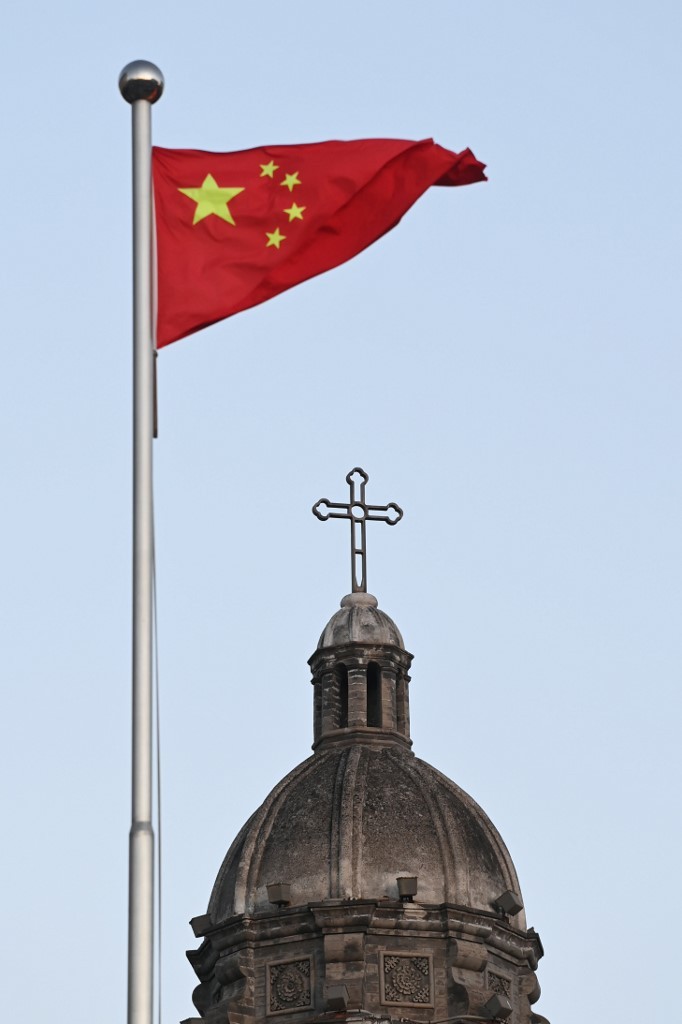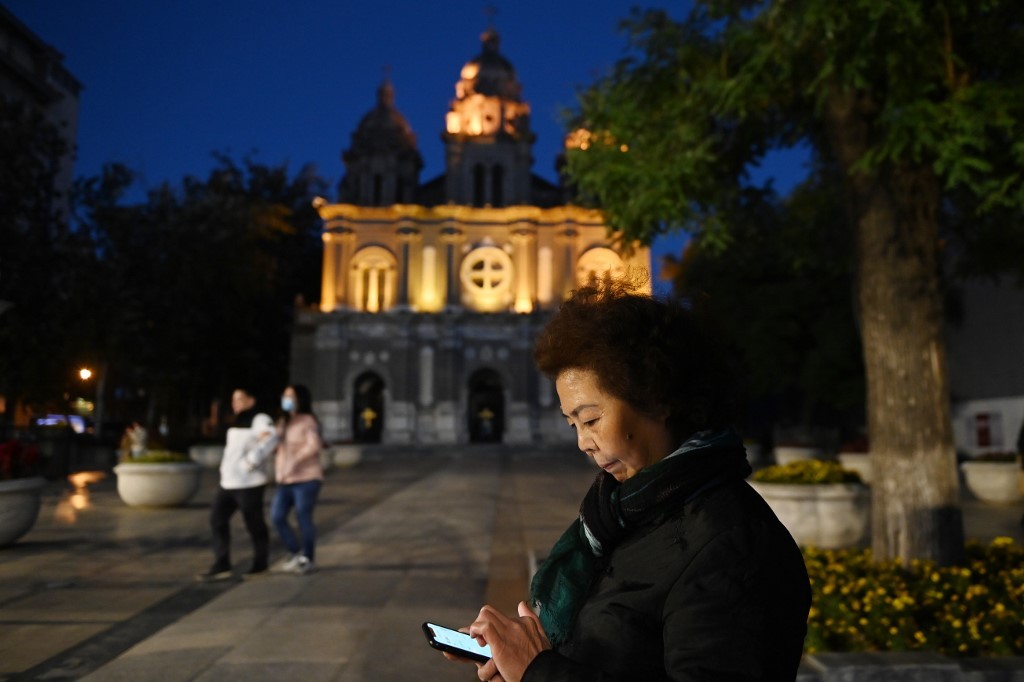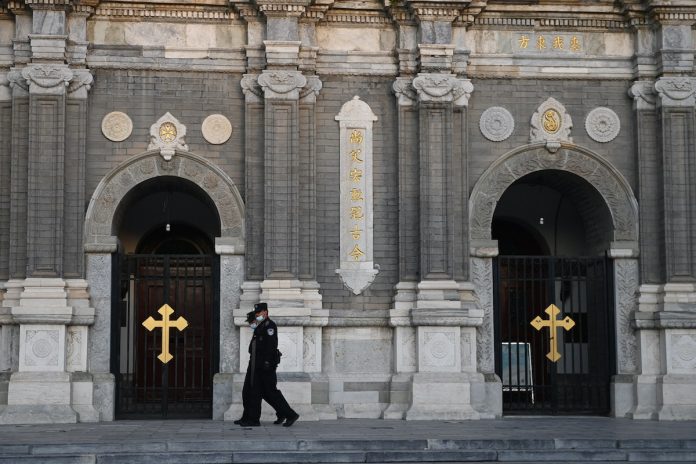The Vatican has renewed this week a controversial “provisional agreement” with China on the appointment of Catholic bishops.
“The initial application has been positive, thanks to the good communication and cooperation between the parties,” read a statement from the Holy See Press Office.
The agreement calls for China to formally recognize the pope’s authority within the Church, while the Vatican in turn recognized the legitimacy of bishops previously appointed by Beijing.
Catholics in China are emerging from more than half a century of division that saw them split between a state-backed “official” Church and a “non-official” underground Church that remained loyal to Rome.
The “provisional agreement,” which was signed in Beijing on Sept. 22, 2018, and went into effect a month later, expired this week.
The the Holy See said it “intends to pursue an open and constructive dialogue for the benefit of the life of the Catholic Church and the good of Chinese people.”
In a statement, the Holy See said “the two parties evaluated various aspects of the agreement’s application … and have agreed to prolong the term for another two years, until October 22, 2022.”
The deal has been highly contested by the US State Department and some Catholics, who say the Vatican has sold out to the communist government.
Many believe the accord will eventually lead to diplomatic relations with Beijing, meaning that the Vatican would have to sever ties with Taiwan.
In a statement to reporters, Cardinal Pietro Parolin, the Vatican’s Secretary of State, said “we are not talking about diplomatic relations.”
“We are concentrated on the Church,” he said, adding that “We are taking one step at a time in the effort to normalize the life of the Church.”
The cardinal said the decision to renew the agreement was made after final contacts with the Chinese side.
“As far as the accord is concerned, we are content. There are still many other problems but we never expected the accord to resolve all the problems,” he said.
‘Sustaining, promoting’ the Gospel
The Holy See said the “primary objective” of the agreement “is that of sustaining and promoting the proclamation of the Gospel” and “restoring the full and visible unity of the Church.”
In its statement, the Vatican said the “primary motivations” are “fundamentally of an ecclesiological and pastoral nature.”

It said the question regarding the appointment of bishops is “of vital importance for the life of the Church, both at the local as well as at the universal levels.”
The Holy See cited “Lumen Gentium,” the Dogmatic Constitution on the Church, to justify its decision, saying that the bishops “should be shepherds in His Church even to the consummation of the world.”
“And in order that the episcopate itself might be one and undivided, He placed Blessed Peter over the other apostles, and instituted in him a permanent and visible source and foundation of unity of faith and communion,” read the document.
The Vatican said “Lumen Gentium” inspired the negotiations with China “and was a point of reference in the drafting of the text of the agreement.”
“Thus will be ensured, little by little as things go forward, both the unity of faith and the communion among the bishops, as well as being able to completely be at the service of the Catholic community in China,” read the Vatican statement.
No more illegitimate ordinations
The Holy See noted that “for the first time after many decades, all of the bishops in China are in communion with the Bishop of Rome.”
“Thanks to the implementation of the agreement, there will be no more illegitimate ordinations,” added the Vatican statement.
It added, however, that “all the open issues or situations that are still of concern for the Church have not been treated” in the agreement except for the issue of episcopal appointments, which was described as “decisive and essential to guarantee the ordinary life of the Church in China.”
In an earlier statement, Cardinal Parolin admitted that “various misunderstandings” had arisen regarding the provisional agreement.
He said most of these issues arose because “unrelated events regarding the life of the Catholic Church in China were attributed to the agreement.”
“It was even connected to political issues that have nothing to do with the actual agreement,” said the cardinal.
Cardinal Parolin said he is aware of the existence of various problems regarding the life of the Catholic Church in China, but also that it is impossible to confront all the issues together.
The Vatican noted that some sectors of international politics “have sought to analyze the Holy See’s work primarily along geopolitical lines.”
The Holy See, however, said it views the deal as a “profoundly ecclesiological issue, in conformity with two principles stated by Saint Ambrose as ‘Where Peter is, there is the Church’ and by Saint Ignatius of Antioch who said that ‘Where the Bishop is, there is the Church.’”
“There also exists an awareness that the dialogue between the Holy See and the People’s Republic of China favors the search for the common good for the benefit of the entire international community,” the Vatican statement said.
Initial worries from Asia
Some Catholics in Asia had earlier expressed fear that China would pressure the Vatican to include Hong Kong in the deal, following the imposition of a new national security law that significantly expanded Beijing’s reach into the city.
In spite of the 2018 agreement, Chinese authorities have continued to remove crosses and demolish church buildings in different regions in China in the past two years.
In April, authorities removed crosses from two church buildings in the Diocese of Anhui. Crosses were also reported removed and a church building demolished in Hebei province’s Handan Diocese.
Hundreds of crosses across China have been removed since October 2018 in dioceses in the provinces of Zhejiang, Henan, Hebei, and Guizhou.
Last year, a church in Hebei province was demolished over accusations of illegal occupation of cultivated land.
So-called “underground Catholics” and members of the clergy also reported continued harassment and detention.
Beijing has been following a policy of “Sinicisation” of religion, trying to root out foreign influences and enforce obedience to the Communist Party, which has ruled China since winning a civil war in 1949.

The controversial deal has divided church leaders inside and outside of China.
Two of the most vocal critics of the deal are Cardinal Joseph Zen, emeritus bishop of Hong Kong, and Cardinal Charles Maung Bo of Yangon.
Cardinal Zen accused Cardinal Parolin as the “one who has in his hands the Chinese dossier.”
“He clearly believes that such a position is necessary to open a new way for the evangelization of the immense Chinese nation. I have strong doubts,” said Cardinal Zen in an earlier statement.
Doubts over the agreement were also raised because of the Vatican’s silence on the issue of Beijing’s alleged human rights abuses against the Uyghurs and other Turkic Muslims in the Xinjiang region.









